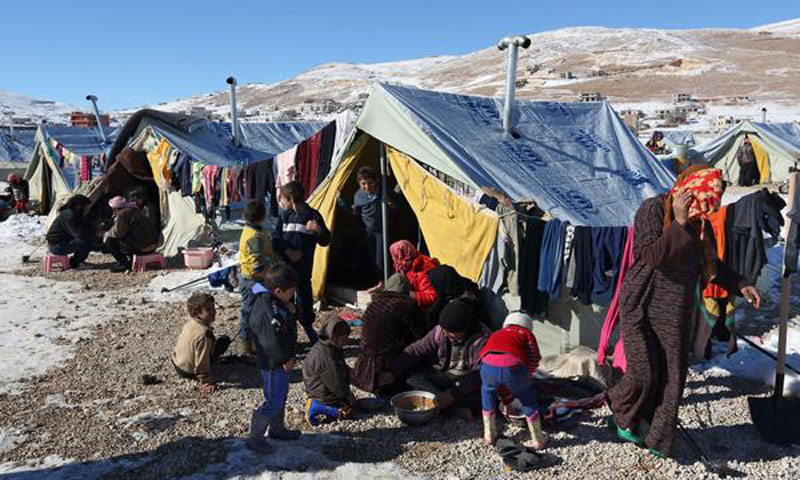Syrian Refugees in Lebanon have received messages from the UN-sponsored World Food Programme, informing them with “deep regret” that October will be the last month to benefit from the food aid provided for them.
Syrians received these messages with much concern, but with little astonishment as they got used to suspending food aid that is closely related to the generosity and the meanness of the international donor community to Syrian refugees around the world.
The decision to stop the World Food Programme was probably affected by political developments as well as field changes and this would add new considerations regarding the provided aid.
After the basket, fear for diesel
Although it did not issue a formal statement through its official platforms or one of its spokesmen regarding its decision to stop the food aid program, Lebanese and Syrian activists confirmed to Enab Baladi the accuracy of the message received by refugees in Lebanon on September 5.
“We regret to inform you that October will be the last month in which you can benefit from WFP assistance because you are no longer eligible for food assistance,” the message said.
Despite its low value that does not exceed $27 per person, the Syrian refugee in Lebanon Aliya Mohammad, who received also the message, told Enab Baladi that the ones who are most affected by the “sudden” decision are large families who have many children, pointing out that the reasons are still unclear.
According to Aliya, refugees are afraid that these decisions will affect winter heating and fuel aids, with a value amounting to $100 a month, through the so-called Red Card. However, in its message to refugees, the United Nations noted the need to keep the Red Card for future assistance, if they are eligible to use it.
“Donors are tired after seven years”
From the point of view of the Lebanese activist Nasser Yassin, research director at Issam Fares Institute of the American University of Beirut, the UN decision to stop the World Food Programme is linked to the scarcity of international funding for the Syrian refugees.
He told Enab Baladi that the decision does not include all the beneficiaries and that the UNHCR will select the excluded people according to “fragility,” which is based on the needs and the socio-economic status of refugees.
Yassin pointed out that this year’s funding is so far less than required and less than that of the same period of last year. “It seems that donors are tired after seven years of the crisis,” he said and added: “I am afraid of what will be worse in the future.”
The number of Syrians benefiting from the World Food Program in Lebanon reached 700,000. Those are using electronic food vouchers of the program to buy food from any of the 500 shops contracted with throughout Lebanon.
Each month, an amount of $27 per person is loaded onto the electronic card, which is funded by donor countries, particularly Germany, Canada and the United States.
The United Nations has previously complained about the weak funding of the World Food Program, announcing its suspension by the end of 2014 for 2 million Syrian refugees in Jordan, Lebanon, Turkey, Iraq and Egypt, to be re-activated in 2015.
Qalamoun conventions … Will they return refugees?
The impact of the political and field developments in the border areas between Syria and Lebanon did not conceal the situation of the Syrian refugees there. It seems that this time it coincided with the Lebanese government’s call for their safe return to their country as a result of the economic “burdens” of one million and 70,000 Syrian refugees, nearly more than a quarter of the population of Lebanon, according to figures of the UNHCR.
Although the majority of them live in difficult conditions in the camps, they believe that these camps are better than returning to their disputed land, in which Hezbollah is a key party.
The Lebanese army, on the one hand, and the Syrian regime army and Hezbollah, on the other, closed the Western Qalamoun file last month after several battles with ISIS. These conventions led to the transfer of its members to Abu Kamal on the Syrian-Iraqi border. Hezbollah imposed its control on the region of Qalamoun, where the majority of Syrian refugees in Lebanon come from.
Some human rights activists and Syrian refugees linked Qalamoun conventions to the suspension of WFP, as a form of pressure on refugees to return to their regions, especially that the Minister of State for Displaced Affairs Mouein Merhebe suggested to the international community working to find a solution for the Syrian crisis, the establishment of safe zones and the reconstruction of Syria, instead of continuing funding humanitarian and relief programmes.
During his meeting with Belgian Immigration Minister Theo Francken on Wednesday 6 September, he added “we need more support to provide a safe return for all displaced people to their houses.”
In this regard, Syrian refugee Aliya Mohammed said that Syrian refugees in Lebanon are under great pressure to return to their country. She pointed out that the United Nations had offered some Syrians, especially from Homs, money to return to their city, but they still refuse it as they feel insecure.
In the absence of a UN statement concerning the suspension of food aid, it is difficult to predict whether it will resume its support for Syrian refugees in Lebanon. This comes while new aid organizations are expected to be in charge of the food support program.

